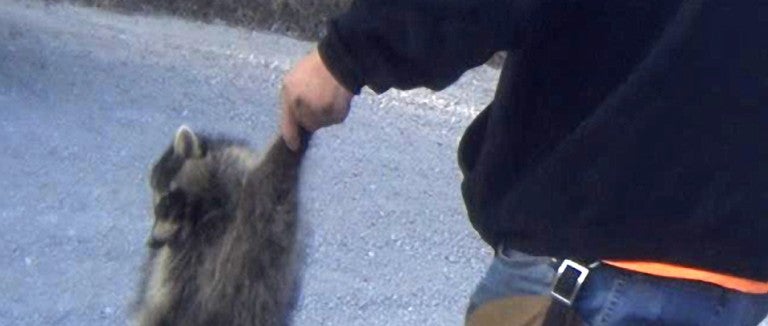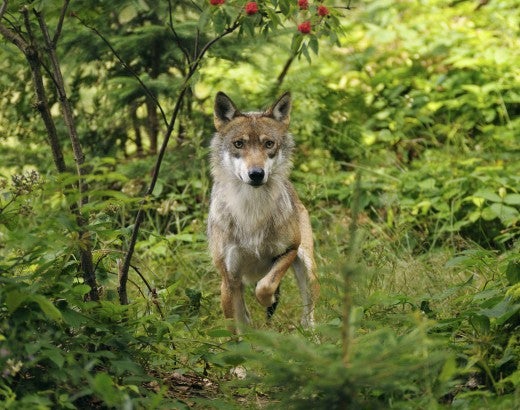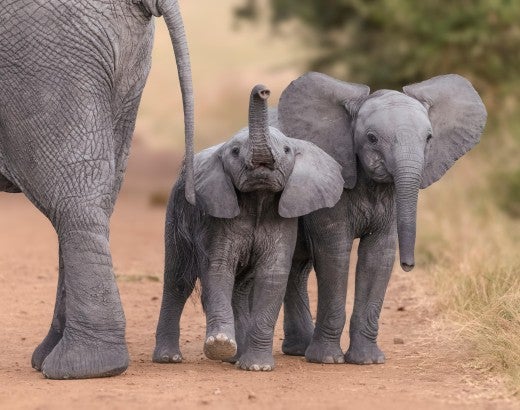As a result of strong opposition from our team and wildlife advocates, a bill was recently defeated in Iowa’s state legislature that would have used taxpayer dollars to incentivize Iowans to kill raccoons. Under the proposed program—which was expected to cost Iowa taxpayers $860,000 each year—participants would have redeemed a $5 voucher for each raccoon tail they submitted to the Iowa Department of Natural Resources during each county’s “monthly raccoon tail pick-up event.”
Such a program would have amounted to state-sanctioned animal abuse: Thousands of raccoons could have been subjected to painful and terrifying trapping, bludgeoning to death and skinning for nothing more than a quick five bucks.
The legislation was based on the false premise that a bounty would prevent raccoons from eating Iowa’s corn and soybean crops. The bill’s author speculated that the state’s raccoon population was increasing because not enough people were killing the animals to sell them to a diminishing fur trade.
Like many states, Iowa has spent millions of dollars on wildlife bounties; none have successfully reduced conflicts with farmers or landowners or served any other legitimate management purpose. In 2019, neighboring South Dakota launched a gruesome “Nest Predator Bounty Program” that awarded $10 for each tail of a raccoon, red fox, opossum, badger and striped skunk killed by residents, while distributing thousands of free wildlife traps and encouraging children as young as 3 years old to participate in the carnage. In the program’s first year, South Dakotans killed more than 50,000 of the state’s native wild animals. But even though the taxpayer-funded South Dakota Game, Fish and Parks paid hundreds of thousands of dollars for the killings, an official recently admitted that the program has been ineffective in its objective of increasing pheasant numbers for hunters.
Wildlife biologists and officials with agencies in Idaho, Michigan, Missouri, New York, North Carolina, Pennsylvania, South Carolina, Tennessee and West Virginia all agree that bounties “devalue the predator” and are “prone to corruption,” “expensive,” “counterproductive” and “totally ineffective.” Research also finds that bounties don’t improve game populations or minimize conflicts.
Yet bounties still exist in some states and result in the unnecessary and violent deaths of thousands of wild animals. In Iowa and across the U.S., traps inflict horrible suffering, both to the target wildlife and to unintended victims such as dogs and cats. The animals are often left in the traps for days—or even weeks in some states—with painful injuries and no ability to seek food or water. They may even chew off their own limbs to try to escape. And when the trappers finally return, they may stomp, strangle or beat the animals to death.
All too often, the animals targeted in bounty programs are maligned and misunderstood. They are killed without any set limit or without evaluation of the potential impact to the population or to the ecosystem of which they are a part. Raccoons, for instance, are intelligent, curious, clever and playful animals who serve as clean-up crew, consuming animal carcasses and prey often viewed as pests in human communities.
The raccoon bounty bill came at a time when Iowa’s state parks need $100 million in infrastructure repairs. “State parks benefit every Iowan, while the raccoon bounty would subsidize cruel trapping for a miniscule number of the state’s residents,” our Iowa state director Preston Moore said. “Less than 7% of Iowans hunt, fish or trap—a figure that has not grown despite state-funded attempts to increase participation.”
The wildlife of a state is held in trust to be managed for the benefit of all its residents. Iowa, South Dakota and other states should abandon the gruesome and outdated relics of bounties and predator control and instead invest in methods that work to prevent conflicts, such as motion-activated lights and sprinklers, loud sound devices and electric wire or fencing. Everyone can help create a humane world for wildlife through our tools, resources and templates for humanely coexisting with raccoons and all of our wild neighbors.
Follow Kitty Block @HSUSKittyBlock.



